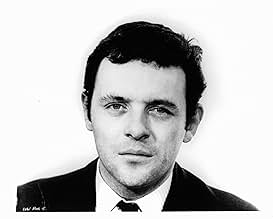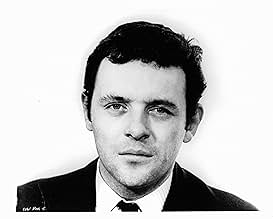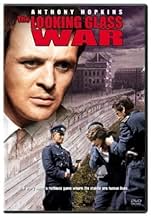IMDb RATING
5.8/10
1.6K
YOUR RATING
From the John le Carré novel about a British spy who sends a Polish defector to East Germany to verify missile sites.From the John le Carré novel about a British spy who sends a Polish defector to East Germany to verify missile sites.From the John le Carré novel about a British spy who sends a Polish defector to East Germany to verify missile sites.
- Director
- Writers
- Stars
- Director
- Writers
- All cast & crew
- Production, box office & more at IMDbPro
5.81.5K
1
2
3
4
5
6
7
8
9
10
Featured reviews
Through the Looking Glass.
Although undeniably the weakest of the three John Le Carre novels to be filmed during the 1960's this is not quite as bad some would have us believe. It proved to be one of only two features to be directed by Frank R. Pierson, the other being the third version of 'A Star is Born'. The latter film at least made money despite a critical drubbing whereas this one failed on both counts.
There are some redeeming features here, notably the cinematography of Austin Dempster and first class performances from Ralph Richardson, Paul Rogers, Robert Urquart and Anthony Hopkins who is slowly moving up the ranks. Hopkins freely admitted that his ambition was to be an international film star and in time would certainly be granted his wish!
The weak link is Christopher Jones whose rather quirky personality at first appeals but then becomes rather tiresome. He is working through his James Dean complex here and in the role of a Pole is not very well dubbed. He was to be even more miscast in 'Ryan's Daughter' which proved to be another nail in his coffin. Also disappointing is Pia Degermark as the love interest. Having shone in 'Elvira Madigan' she is rather bland here and despite her off-screen relationship with Jones there is precious little chemistry.
Even by the author's standards the material is pretty bleak and Mister Pierson alas is not in the same league as Messrs. Ritt and Lumet.
Where it does succeed admirably is in depicting the soul-destroying and morally ambiguous nature of the Espionage business where human beings are nothing if not expendable.
"War is hell, Mr. Thornhill. Even when it's a Cold one"!
26/04/2021: Congrats to Mr. Hopkins on his well-deserved Academy Award.
There are some redeeming features here, notably the cinematography of Austin Dempster and first class performances from Ralph Richardson, Paul Rogers, Robert Urquart and Anthony Hopkins who is slowly moving up the ranks. Hopkins freely admitted that his ambition was to be an international film star and in time would certainly be granted his wish!
The weak link is Christopher Jones whose rather quirky personality at first appeals but then becomes rather tiresome. He is working through his James Dean complex here and in the role of a Pole is not very well dubbed. He was to be even more miscast in 'Ryan's Daughter' which proved to be another nail in his coffin. Also disappointing is Pia Degermark as the love interest. Having shone in 'Elvira Madigan' she is rather bland here and despite her off-screen relationship with Jones there is precious little chemistry.
Even by the author's standards the material is pretty bleak and Mister Pierson alas is not in the same league as Messrs. Ritt and Lumet.
Where it does succeed admirably is in depicting the soul-destroying and morally ambiguous nature of the Espionage business where human beings are nothing if not expendable.
"War is hell, Mr. Thornhill. Even when it's a Cold one"!
26/04/2021: Congrats to Mr. Hopkins on his well-deserved Academy Award.
Flawed but very interesting interpretation of the novel, worth seeing
Frank Pierson made a very ambitious bet when he wrote the screenplay and directed the film version of John Le Carré's The Looking Glass War. I admire that ambition, but he only partially succeeded. The novel is a bitter, dark and gritty tale, with lots of satire, of old spymasters reliving their past glories. For that reason they are not up to the job of managing a modern and "Cold" War. Instead of "simply" telling that great and worthy story, Pierson seems to have been inspired by the Swinging 60's, with counterculture movements and young people everywhere pushing back against previous generations, to make an even bigger and more flamboyant statement of generational angst than Le Carré intended. This might have worked if executed well, but a few mistakes undercut him. He chose two beautiful, quirky, fast-rising stars, Christopher Jones and Pia Degermark as the leads. Jones' recruitment scenes were not believable, and neither was Degermark's two deus ex machina moments of entering the spy's life. But they were very nice to watch, and the very good cinematography helped, too. A few other turn-offs, for me were several tedious segments when I thought Pierson was channelling Michelangelo Antonioni, location shots that do not look like anyplace I've ever seen in Germany, as well an overly abrupt ending. In the end Pierson seems to have abandoned Le Carré's biting satire, and he jumbled the shift to generational angst.
Disappointing adaptation of a good book
A disappointing adaptation of a good book, with a key aspect of the latter (inter-departmental rivalry) being omitted. I located an on-line copy after the usual frustrations of working through links to Youtube that led to short clips, paid subscription copies and so on.
With several jumps in the plot, I did wonder if the version I saw had been hacked around, but it was the 108 minutes stated here on IMDb. Christopher Jones was unconvincing and uninspiring as Leiser, his fight with Avery a prolonged interpolation and his scrabbling around to get under the wire in the dark protracted. And how lucky he was to come across an attractive girl and child (what happened to him?) in the middle of nowhere - and to bump into her again in a cafe.
The best things were the wide, open European spaces and Anthony Hopkins' acting
With several jumps in the plot, I did wonder if the version I saw had been hacked around, but it was the 108 minutes stated here on IMDb. Christopher Jones was unconvincing and uninspiring as Leiser, his fight with Avery a prolonged interpolation and his scrabbling around to get under the wire in the dark protracted. And how lucky he was to come across an attractive girl and child (what happened to him?) in the middle of nowhere - and to bump into her again in a cafe.
The best things were the wide, open European spaces and Anthony Hopkins' acting
I found this mesmerising...but then I live through it.
Christoper Jones does a great job. And with Ralph Richardson and Sir Tony Hopkins in support you have to have a real experience. Maybe some people weren't happy that Jones wasn't James Bond. I don't think he was ever meant to be. This is an entirely different protagonist...much more realistic and human. Even with the "correct papers" you were guilty until proven innocent once you entered the Soviet Bloc. The danger he faces was as great as any 007. And he does so without the weapons that J. Bond was provided with. Like Bond, a seemingly impossible mission. But with none of the "Tier One" hardware that Bond ever had. Just a man...no super powers...not even a pistol. This "unfair" powers of force provides a deeper and more subtle level of suspense and tension. He can't survive can he? Can he complete his mission? So I don't spoil it for you I won't go on. Let me say this is one of the best Cold War spy movies I've seen and Jones deserves a great deal of credit. Enjoy.
He was an inexperienced man clutched out of crises and thrown into an impossible situation. I think he pulls this off quite well. Very few remember;e the danger and suspense of penetrating East Germany. The constant striving to be free against the murderous boot of the Stasi.
He was an inexperienced man clutched out of crises and thrown into an impossible situation. I think he pulls this off quite well. Very few remember;e the danger and suspense of penetrating East Germany. The constant striving to be free against the murderous boot of the Stasi.
"we didn't really know him at all; a bit like a waiter in your club..."
Made in 1969 this adaptation of a Le Carré novel isn't faithful to every element of the original book, and is heavily influenced by other contemporary films.
This means it isn't quite as uniformly bleak as many other Le Carré adaptations but depending on how you take it, it is perhaps hard to really believe in or sympathise with any of the characters. This is despite some pretty good performances by some of the lead actors.
What is perhaps missing is the clever editing, taut direction and sheer screen presence that (say) Michael Caine brings to the Harry Palmer movies (even though the plots of those are not exactly uniformly brilliant) or Richard Burton brings to "the spy who came in from the cold". Those movies stand head and shoulders above this.
Technically this film is well-photographed and the dubbing is well done too; however it is perhaps understandable if the pace of the film wanders, given that it looks a lot like they decided to shoehorn various sequences into the plot purely for stylistic reasons.
Some of the criticisms in the other reviews here are spot on and others are (IMHO) thoroughly misplaced; no spoilers here so you will have to work out which for yourself. I guess it is a bit of a curate's egg, this; "good in parts". Therefore if you approach it with suitable expectations you will probably find enough things about this movie to like to make it worth watching.
Overall this film probably isn't as bad as the knockers would lead you to suppose and nor is it as good as the 'ten' folk make out either. It is certainly an interesting period piece but it is also a little more than that too, so it gets 6/10 from me.
This means it isn't quite as uniformly bleak as many other Le Carré adaptations but depending on how you take it, it is perhaps hard to really believe in or sympathise with any of the characters. This is despite some pretty good performances by some of the lead actors.
What is perhaps missing is the clever editing, taut direction and sheer screen presence that (say) Michael Caine brings to the Harry Palmer movies (even though the plots of those are not exactly uniformly brilliant) or Richard Burton brings to "the spy who came in from the cold". Those movies stand head and shoulders above this.
Technically this film is well-photographed and the dubbing is well done too; however it is perhaps understandable if the pace of the film wanders, given that it looks a lot like they decided to shoehorn various sequences into the plot purely for stylistic reasons.
Some of the criticisms in the other reviews here are spot on and others are (IMHO) thoroughly misplaced; no spoilers here so you will have to work out which for yourself. I guess it is a bit of a curate's egg, this; "good in parts". Therefore if you approach it with suitable expectations you will probably find enough things about this movie to like to make it worth watching.
Overall this film probably isn't as bad as the knockers would lead you to suppose and nor is it as good as the 'ten' folk make out either. It is certainly an interesting period piece but it is also a little more than that too, so it gets 6/10 from me.
Did you know
- TriviaA radio play of John le Carré's novel "The Looking Glass War" was produced and broadcast by Radio 4 in 2009, with Simon Russell Beale as George Smiley, Piotr Baumann as Leiser, Patrick Kennedy as Avery, and Ian McDiarmid as LeClerc. This radio play featured the George Smiley character, who had been dropped for this movie.
- GoofsThe photograph of a railway yard that was the pretext for the mission was supposedly taken in East Germany but the locomotive in the picture is immediately recognizable to any ex-trainspotter as a British Rail type manufactured by English Electric.
- Quotes
Leiser: What's your name?
John Avery: You can't have my name, it's a breach of security.
Leiser: You know, I'm risking my life for you so I want a name, give me a name, I don't care. Any name!
John Avery: John.
Leiser: John. John.
- ConnectionsFeatured in Al Murray's Great British Spy Movies (2014)
- How long is The Looking Glass War?Powered by Alexa
Details
- Release date
- Country of origin
- Official site
- Languages
- Also known as
- John le Carré's The Looking Glass War
- Filming locations
- Spain(made on location in Europe, kinema weekly 19/10 68)
- Production companies
- See more company credits at IMDbPro
Box office
- Gross US & Canada
- $168,000
- Runtime
- 1h 48m(108 min)
- Color
- Aspect ratio
- 2.35 : 1
Contribute to this page
Suggest an edit or add missing content











































